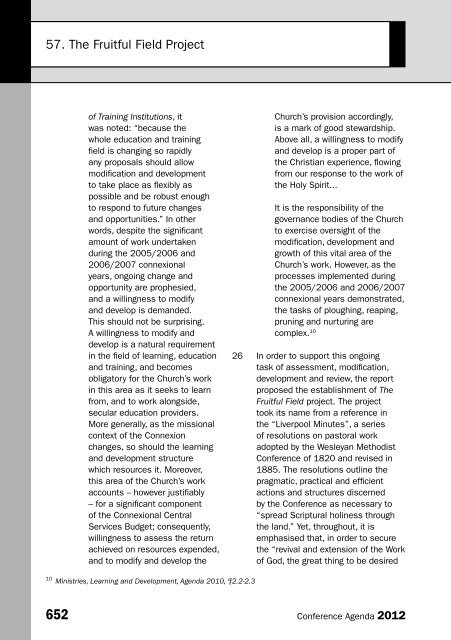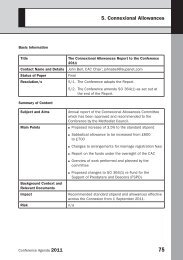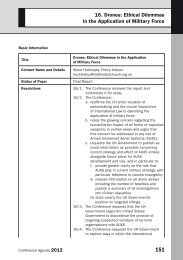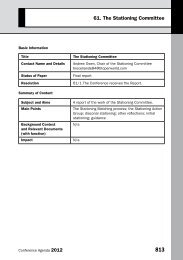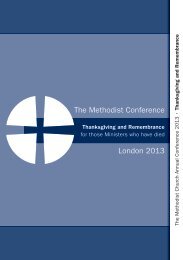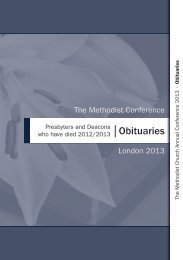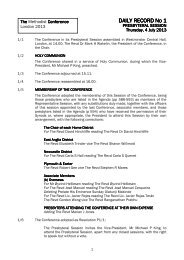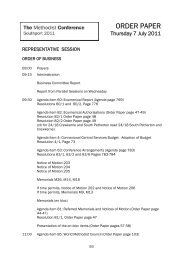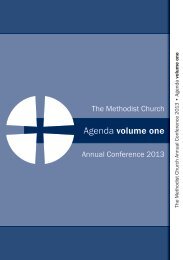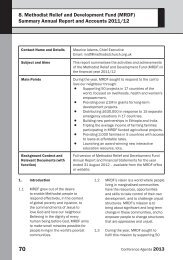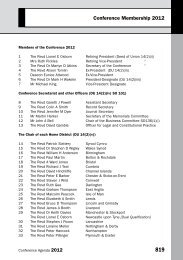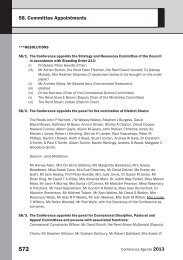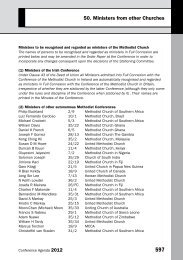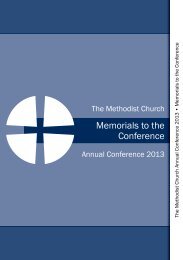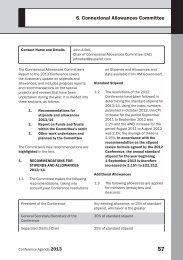Agenda Volume 3 - Methodist Conference
Agenda Volume 3 - Methodist Conference
Agenda Volume 3 - Methodist Conference
You also want an ePaper? Increase the reach of your titles
YUMPU automatically turns print PDFs into web optimized ePapers that Google loves.
57. The Fruitful Field Project<br />
of Training Institutions, it<br />
was noted: “because the<br />
whole education and training<br />
field is changing so rapidly<br />
any proposals should allow<br />
modification and development<br />
to take place as flexibly as<br />
possible and be robust enough<br />
to respond to future changes<br />
and opportunities.” In other<br />
words, despite the significant<br />
amount of work undertaken<br />
during the 2005/2006 and<br />
2006/2007 connexional<br />
years, ongoing change and<br />
opportunity are prophesied,<br />
and a willingness to modify<br />
and develop is demanded.<br />
This should not be surprising.<br />
A willingness to modify and<br />
develop is a natural requirement<br />
in the field of learning, education<br />
and training, and becomes<br />
obligatory for the Church’s work<br />
in this area as it seeks to learn<br />
from, and to work alongside,<br />
secular education providers.<br />
More generally, as the missional<br />
context of the Connexion<br />
changes, so should the learning<br />
and development structure<br />
which resources it. Moreover,<br />
this area of the Church’s work<br />
accounts – however justifiably<br />
– for a significant component<br />
of the Connexional Central<br />
Services Budget; consequently,<br />
willingness to assess the return<br />
achieved on resources expended,<br />
and to modify and develop the<br />
Church’s provision accordingly,<br />
is a mark of good stewardship.<br />
Above all, a willingness to modify<br />
and develop is a proper part of<br />
the Christian experience, flowing<br />
from our response to the work of<br />
the Holy Spirit...<br />
It is the responsibility of the<br />
governance bodies of the Church<br />
to exercise oversight of the<br />
modification, development and<br />
growth of this vital area of the<br />
Church’s work. However, as the<br />
processes implemented during<br />
the 2005/2006 and 2006/2007<br />
connexional years demonstrated,<br />
the tasks of ploughing, reaping,<br />
pruning and nurturing are<br />
complex. 10<br />
26 In order to support this ongoing<br />
task of assessment, modification,<br />
development and review, the report<br />
proposed the establishment of The<br />
Fruitful Field project. The project<br />
took its name from a reference in<br />
the “Liverpool Minutes”, a series<br />
of resolutions on pastoral work<br />
adopted by the Wesleyan <strong>Methodist</strong><br />
<strong>Conference</strong> of 1820 and revised in<br />
1885. The resolutions outline the<br />
pragmatic, practical and efficient<br />
actions and structures discerned<br />
by the <strong>Conference</strong> as necessary to<br />
“spread Scriptural holiness through<br />
the land.” Yet, throughout, it is<br />
emphasised that, in order to secure<br />
the “revival and extension of the Work<br />
of God, the great thing to be desired<br />
10 Ministries, Learning and Development, <strong>Agenda</strong> 2010, 2.2-2.3<br />
652 <strong>Conference</strong> <strong>Agenda</strong> 2012


